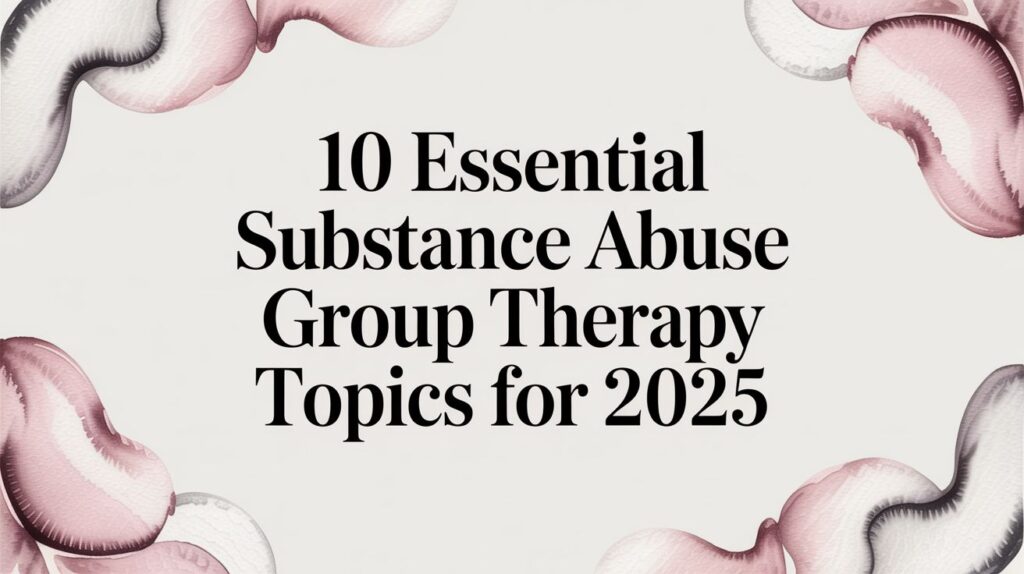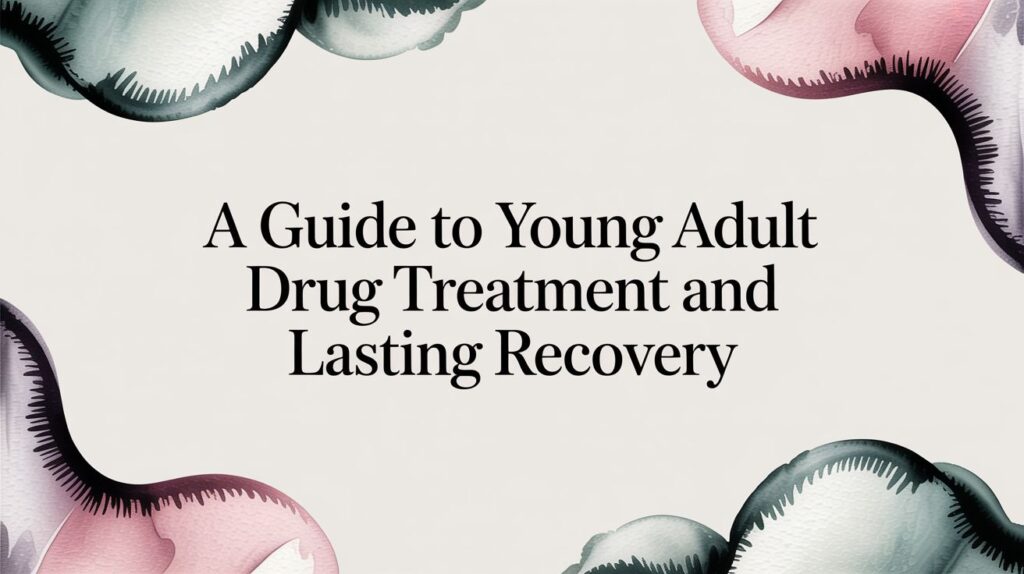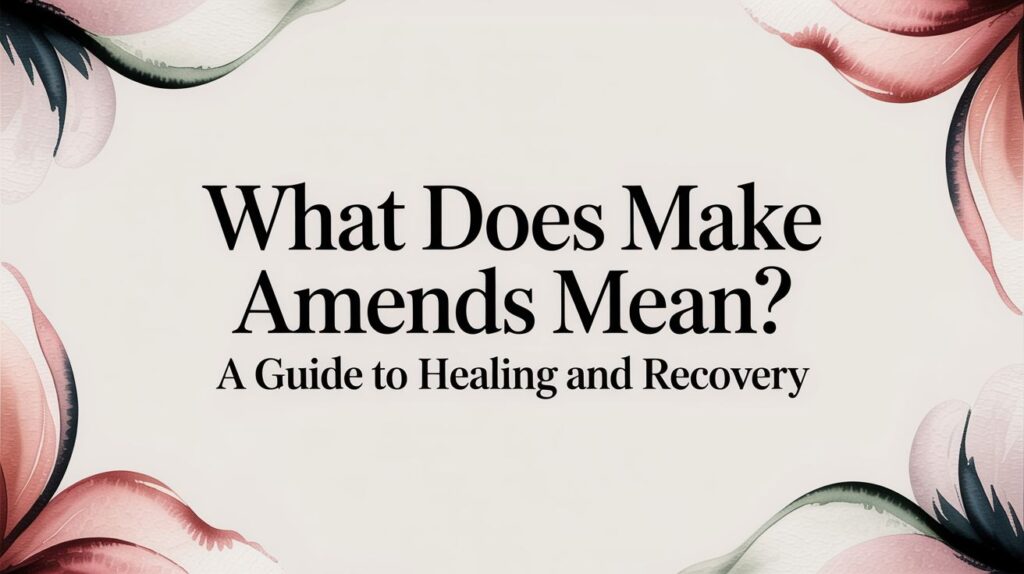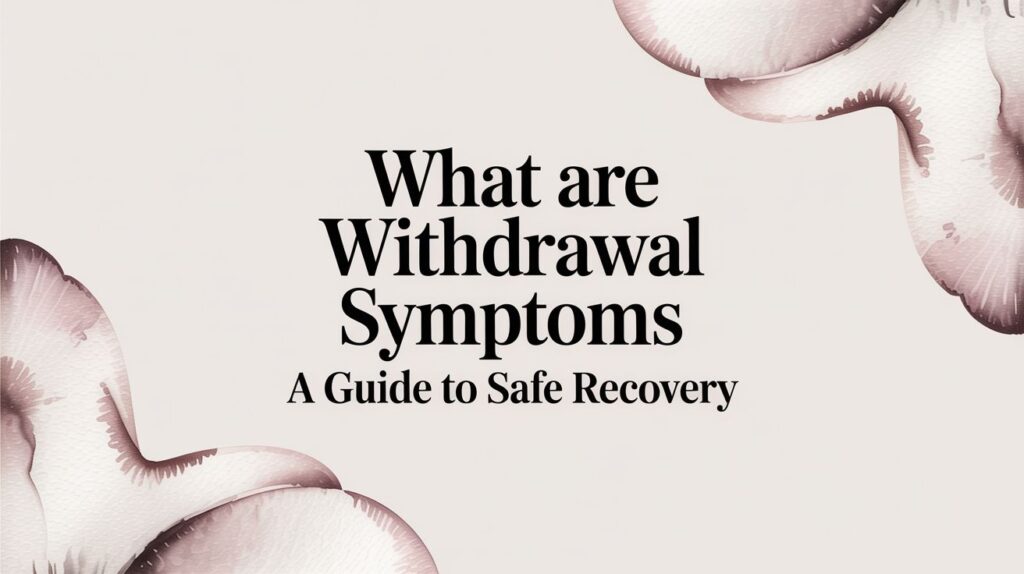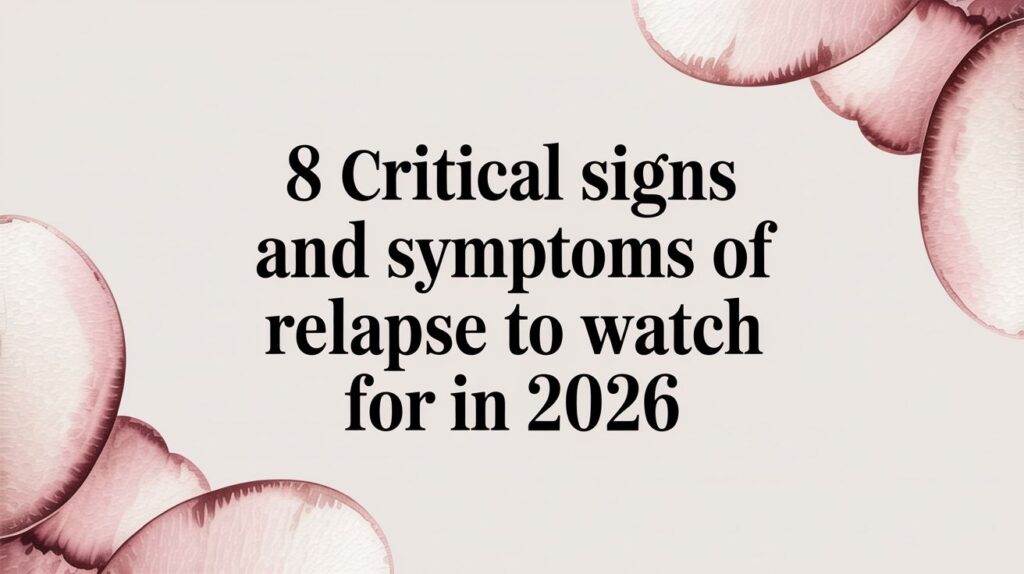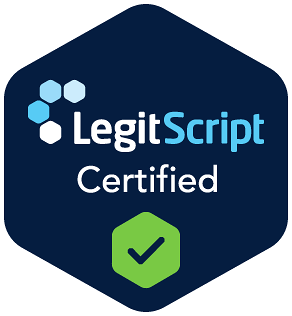Substance abuse group therapy is a cornerstone of effective recovery, providing a safe space for shared experiences, peer support, and skill-building. Yet, the power of these sessions hinges on the depth and relevance of the topics discussed. Moving beyond generic conversation starters to structured, evidence-based themes can dramatically accelerate healing and foster lasting change. The success of any group setting, whether for working professionals needing flexible options or young adults navigating life transitions, depends on a curriculum that is both comprehensive and engaging.
This guide explores 10 essential substance abuse group therapy topics designed to address the multifaceted nature of addiction. It is a practical resource for individuals in recovery, their families, and the facilitators who guide them. We will move beyond theory to provide concrete tools for building a strong foundation for sobriety.
Readers will find a detailed roadmap for navigating the complex journey of recovery. For each of the 10 core themes, we will present:
- Clear session objectives to define the purpose of each discussion.
- Actionable activities and prompts to spark meaningful interaction.
- Expert facilitation tips to manage group dynamics effectively.
From mastering relapse prevention and repairing family dynamics to managing co-occurring disorders like anxiety or depression, these frameworks are crucial for creating dynamic and effective group sessions. The goal is to empower participants with the skills and insights needed to achieve real, sustainable freedom from substance dependency and build a fulfilling life.
1. Relapse Prevention and Coping Strategies
Relapse prevention is a cornerstone of effective substance abuse group therapy topics, providing clients with the essential tools to navigate the challenges of long-term recovery. This theme moves beyond simple abstinence, focusing instead on proactive strategies to identify and manage high-risk situations before they lead to substance use. Based on cognitive-behavioral principles popularized by Terence Gorski and Alan Marlatt, this approach helps participants understand that relapse is a process, not a singular event, and can be intercepted at multiple points.
Session Objectives and Approach
The primary goal is to equip group members with a personalized relapse prevention plan. Sessions aim to help individuals recognize their unique internal and external triggers, from emotional states like loneliness or anger to environmental cues like specific people or places. A key component is developing a robust "coping skills toolkit" filled with healthy, accessible alternatives to substance use.
For many, this process is supported by structured frameworks. A fundamental aspect of relapse prevention often involves exploring the 12 steps of recovery and how this process helps heal addiction by providing a clear path for self-reflection and peer support.
Practical Group Activities
- Trigger Mapping: Members create a visual map or list detailing their personal triggers, rating them by intensity, and brainstorming an immediate coping strategy for each one.
- Role-Playing Scenarios: Facilitators present common high-risk situations (e.g., attending a party where alcohol is served, receiving stressful news) and have members practice refusal skills and coping responses in a safe environment.
- Cravings Management Plan: Participants develop a step-by-step "playbook" for what to do in the first five minutes of a craving, including mindfulness exercises, calling a support person, or engaging in a distracting activity. This written plan becomes an accessible tool during moments of vulnerability.
2. Cognitive Behavioral Therapy (CBT) for Substance Abuse
Cognitive Behavioral Therapy (CBT) is a foundational topic in substance abuse group therapy, focusing on the powerful link between thoughts, feelings, and actions. Popularized by pioneers like Aaron Beck, this evidence-based approach helps participants understand how automatic negative thoughts and distorted beliefs fuel the cycle of addiction. By learning to identify and challenge these cognitive patterns, individuals can develop healthier behaviors and emotional responses, disrupting the ingrained habits that lead to substance use.
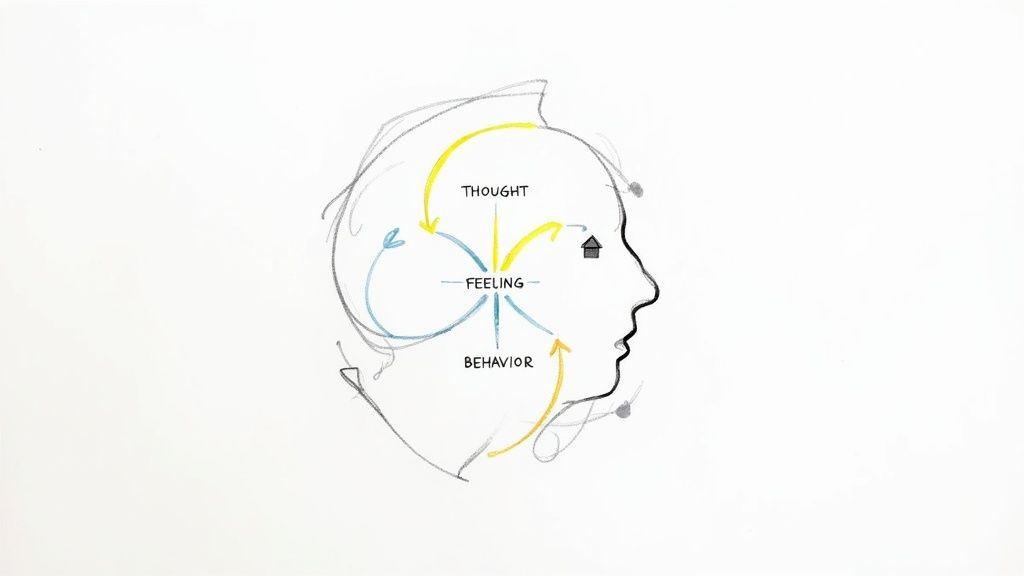
Session Objectives and Approach
The primary objective of a CBT group is to empower members with the skills to become their own therapists. Sessions focus on identifying cognitive distortions, such as "all-or-nothing thinking" or "catastrophizing," that are common in substance use disorders. Facilitators guide the group in analyzing these thoughts, evaluating the evidence for and against them, and formulating more balanced, realistic alternatives.
This structured process helps individuals build self-awareness and regain control over their reactions to triggers. The approach is highly practical and skill-based, making it one of the most effective substance abuse group therapy topics for creating tangible, lasting change in thinking and behavior.
Practical Group Activities
- Thought Record Worksheets: Members use a structured worksheet to document a triggering situation, identify the automatic thoughts and emotions that followed, challenge any cognitive distortions, and develop an alternative, more adaptive response.
- Behavioral Experiments: The group collaboratively designs real-world "experiments" for members to test their negative beliefs. For example, a person who believes they can't socialize without alcohol might be challenged to attend a sober event and report back on their experience.
- Role-Playing Cognitive Restructuring: A member shares a common negative thought (e.g., "I'll never be able to stay sober"), and the group works together to practice challenging and reframing that belief from different perspectives, building collective problem-solving skills.
3. Motivational Interviewing and Stages of Change
Motivational Interviewing (MI) and the Stages of Change model provide a powerful, client-centered framework for substance abuse group therapy topics. This approach, developed by William R. Miller and popularized by James O. Prochaska and Carlo DiClemente, helps participants resolve their natural ambivalence about recovery. It shifts the focus from confrontation to collaboration, empowering group members to find their own intrinsic motivation for change rather than having it imposed upon them.
Session Objectives and Approach
The primary goal is to help clients identify where they are in the cyclical process of change (precontemplation, contemplation, preparation, action, maintenance) and use that awareness to build momentum. Sessions are designed to be non-judgmental spaces where members can safely explore their conflicting feelings about substance use. The facilitator acts as a guide, using MI techniques like open-ended questions, affirmations, reflective listening, and summarizing (OARS) to elicit "change talk" from the participants themselves.
This person-centered approach acknowledges that readiness for change varies and respects each individual's autonomy. By exploring the pros and cons of their substance use, members can build self-efficacy and resolve the internal conflict that often stalls progress.
Practical Group Activities
- Decisional Balance Worksheet: Members complete a four-quadrant worksheet listing the pros and cons of continuing substance use alongside the pros and cons of changing their behavior. This visual tool helps clarify ambivalence and often tips the scales toward recovery.
- Readiness Ruler: Participants are asked to rate their current motivation to change on a scale of 1 to 10. The facilitator then asks follow-up questions like, "Why a 4 and not a 2?" or "What would it take to get from a 4 to a 6?" This sparks conversation about personal motivations and barriers without judgment.
- Values Card Sort: Group members sort through cards with different personal values (e.g., family, health, honesty, security) and identify their top five. The group then discusses how their substance use aligns or conflicts with these core values, creating a powerful internal incentive for change.
4. Family dynamics and relationship repair
Substance abuse profoundly impacts the entire family system, often leading to broken trust, enabling behaviors, and communication breakdowns. As one of the most vital substance abuse group therapy topics, this theme guides clients in understanding how addiction has shaped their family roles and relationships. Drawing from principles of Family Systems Theory, popularized by pioneers like Salvador Minuchin, this approach helps individuals recognize and change unhealthy patterns, fostering an environment where both the individual and their family can heal.

Session Objectives and Approach
The primary goal is to help group members repair damaged relationships and establish healthier family dynamics that support long-term recovery. Sessions focus on educating members about concepts like codependency, enabling, and dysfunctional family roles (e.g., the hero, the scapegoat). The facilitator helps clients move from a place of blame toward mutual understanding and accountability.
A critical aspect of this process involves teaching concrete skills for effective communication and boundary-setting. This empowers individuals to break cycles of conflict and re-establish trust over time. This approach is central to many hospital-based family therapy tracks and community recovery programs that recognize the family's crucial role in the recovery journey.
Practical Group Activities
- Family Genogram Mapping: Members create a family genogram, a visual map of their family tree that includes relationship dynamics and patterns of substance use. This tool helps them identify intergenerational patterns and better understand the context of their own addiction.
- Boundary Setting Role-Play: The group practices setting firm yet compassionate boundaries in scenarios like refusing a loan to a family member still using substances or stating needs for sober social events. This builds confidence for real-life conversations.
- "Letters of Amends" Workshop: Participants draft letters to family members they have harmed, focusing on taking responsibility without making excuses. These letters may or may not be sent, but the exercise itself is a powerful step toward acknowledging harm and fostering self-forgiveness.
5. Trauma and Dual Diagnosis Recovery
Addressing trauma and dual diagnosis is a critical and specialized component of substance abuse group therapy topics. This approach recognizes that for many individuals, substance use is a coping mechanism for underlying trauma or co-occurring mental health conditions like PTSD, anxiety, or depression. Pioneered by experts like Bessel van der Kolk and integrated into frameworks like SAMHSA's trauma-informed care guidelines, this theme shifts the focus from "what is wrong with you" to "what happened to you," creating a path for holistic healing.
Session Objectives and Approach
The primary goal is to create a safe, stable environment where group members can explore the intricate link between their trauma, mental health, and substance use without being re-traumatized. Sessions are designed to build a foundation of safety and coping skills before delving into traumatic content. The facilitator’s role is to guide the group in understanding how unresolved trauma manifests in addictive behaviors and to introduce adaptive, non-substance-based strategies for managing triggers and emotional dysregulation.
Integrated treatment is essential, as addressing one issue without the other often leads to poor outcomes. These sessions often serve as a vital component of a broader treatment plan, which may include dedicated mental health services for dual diagnosis clients to ensure both conditions receive appropriate care.
Practical Group Activities
- Grounding Techniques Practice: Members learn and practice simple, body-based grounding exercises (e.g., the 5-4-3-2-1 sensory method, deep breathing) to manage dissociation or moments of high anxiety during sessions.
- Window of Tolerance Mapping: Participants create a personal diagram of their "window of tolerance," identifying what it feels like to be hyper-aroused (anxious, angry) or hypo-aroused (numb, disconnected) and listing skills to help them return to a state of calm.
- Safe Place Visualization: The facilitator guides the group through a meditation to create a detailed "safe place" in their minds, an internal resource they can access when feeling overwhelmed by traumatic memories or cravings. This empowers them with a tool for self-soothing.
6. Life Skills and Wellness Building
Building essential life skills and promoting holistic wellness are practical and empowering substance abuse group therapy topics. This theme addresses the reality that active addiction often disrupts the development of fundamental daily living abilities, leaving individuals ill-equipped to manage the stressors of a sober life. By focusing on tangible skills like financial planning, time management, and nutrition, these sessions help clients build a stable foundation that makes long-term recovery not just possible, but sustainable.
This approach is heavily influenced by frameworks like SAMHSA's Wellness Initiative, which views recovery through eight dimensions of wellness. The goal is to move beyond mere abstinence and cultivate a life that is genuinely fulfilling and resilient. By improving overall quality of life, the motivation to remain sober is internally reinforced.
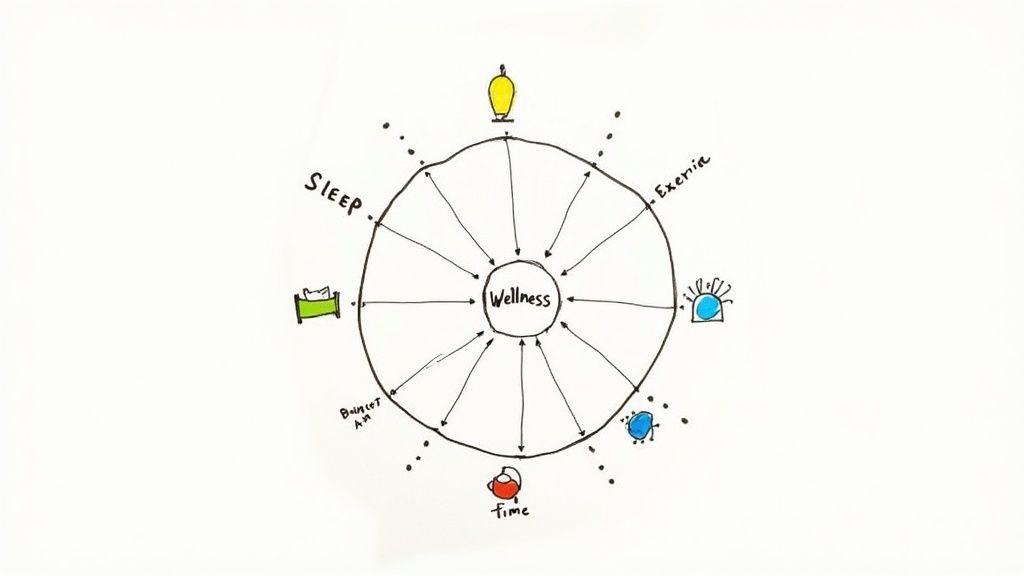
Session Objectives and Approach
The primary objective is to provide group members with actionable strategies to manage daily responsibilities and enhance their physical and mental well-being. Sessions are designed to be highly practical, focusing on rebuilding routines and habits that were neglected during substance use. The approach is educational and skill-based, empowering clients with the confidence to navigate life's challenges without resorting to substances.
For many, this involves creating a personalized wellness plan. A core component of this topic is helping clients see how interconnected different life areas are; for instance, poor sleep hygiene can increase stress, which in turn can trigger cravings. The group setting provides a space for members to share successes and troubleshoot common obstacles together.
Practical Group Activities
- Weekly Goal Setting and Accountability: Members set one small, achievable wellness or life skill goal for the week (e.g., create a budget, cook three healthy meals, go for a 20-minute walk daily). The following session begins with members sharing their progress, challenges, and what they learned.
- Time Management Matrix: Using a simple four-quadrant grid (Urgent/Important, Not Urgent/Important, etc.), participants categorize their weekly tasks. This exercise helps them prioritize responsibilities, reduce feelings of being overwhelmed, and intentionally schedule time for self-care.
- "Wellness Toolbox" Creation: Each member creates a physical or digital list of healthy activities they enjoy across different wellness dimensions (physical, emotional, social, etc.). This becomes a go-to resource when they feel stressed, bored, or are experiencing cravings, providing immediate, healthy alternatives.
7. Spirituality and Meaning-Making in Recovery
Exploring spirituality and finding a sense of purpose is a powerful component among substance abuse group therapy topics, offering a pathway to hope and resilience that extends beyond sobriety alone. This theme is intentionally broad, designed to be inclusive of all clients, whether they follow a specific religion, identify as spiritual but not religious, or hold secular or agnostic views. Drawing from traditions like the spiritual principles of 12-Step programs and the value-based approaches of SMART Recovery, these discussions help participants connect with something larger than themselves and discover meaning in a life free from substance use.
Session Objectives and Approach
The primary goal is to help group members cultivate a personal sense of meaning, purpose, and connection that can sustain them through the challenges of recovery. Sessions focus on exploring existential questions, identifying core personal values, and developing practices that foster inner peace and a sense of belonging. The approach is non-prescriptive, emphasizing that spirituality is a deeply personal journey.
For many, this exploration involves finding a community that aligns with their beliefs. A key part of this process can be examining how different frameworks, including secular options, support long-term recovery. For instance, facilitators might discuss the non-theistic principles of Recovery Dharma, which uses Buddhist practices and principles to heal the suffering of addiction.
Practical Group Activities
- Values Clarification Exercise: Members are given a list of core values (e.g., honesty, compassion, freedom, security) and asked to identify their top five. The group then discusses how their substance use conflicted with these values and how recovery allows them to live more authentically.
- Gratitude Journaling Prompt: The session begins with a short, guided meditation followed by five minutes of silent journaling on the prompt: “What are three things you are grateful for today that you couldn’t appreciate during active addiction?” Members can share one item if they feel comfortable.
- Meaning and Purpose Collage: Using magazines, art supplies, and images, participants create a collage that represents what gives their life meaning now. This visual tool helps individuals articulate abstract concepts and serves as a powerful reminder of their reasons for staying sober.
8. Social Skills and Healthy Relationships
Substance use disorder often isolates individuals, eroding their ability to form and maintain healthy connections. This group therapy topic directly addresses the interpersonal challenges that fuel addiction and hinder recovery by focusing on building essential social skills. The approach is grounded in the idea that strong, supportive relationships are a powerful buffer against relapse. It provides a safe, structured environment to unlearn dysfunctional communication patterns and practice new, pro-social behaviors.
Session Objectives and Approach
The primary goal is to rebuild clients’ confidence and competence in social interactions. Sessions focus on teaching and practicing concrete skills like assertiveness, active listening, setting boundaries, and resolving conflict constructively. By improving their interpersonal effectiveness, members can create a sober support network that replaces the one built around substance use.
The efficacy of this group work is rooted in observational learning and peer reinforcement. To further explore the foundational principles of how individuals learn from each other, a concept vital for understanding group dynamics, consider the insights offered by Social Learning Theory. This framework explains how members can model healthy behaviors they see in the group, accelerating their own growth.
Practical Group Activities
- Boundary Setting Role-Play: Members practice saying "no" to requests that compromise their recovery (e.g., a friend asking them to go to a bar). The group provides feedback on tone, body language, and clarity.
- "I Statement" Workshop: The facilitator teaches the "I feel [emotion] when you [behavior] because [reason]" formula for expressing needs without blame. Participants then rephrase accusatory statements into "I statements" related to their own lives.
- Building a Support Network Map: Each member visually maps their current social circle, identifying supportive, neutral, and high-risk relationships. They then brainstorm concrete steps to strengthen positive connections and distance themselves from negative influences.
9. Substance-Specific Education and Harm Reduction
Integrating substance-specific education and harm reduction into substance abuse group therapy topics provides a foundation of factual knowledge that empowers clients. This approach demystifies addiction by explaining the neurobiological effects of specific drugs, their health consequences, and the mechanisms of dependency. It pairs this scientific understanding with harm reduction principles, which aim to minimize the negative consequences of substance use for individuals who are not yet ready or able to achieve complete abstinence.
Session Objectives and Approach
The primary objective is to foster informed decision-making by equipping members with accurate, non-judgmental information from sources like the National Institute on Drug Abuse (NIDA). Sessions focus on the physiological and psychological impact of specific substances, from alcohol and opioids to stimulants and cannabis. The harm reduction component introduces practical strategies for safety, such as overdose prevention, using clean supplies, and understanding the risks of mixing substances.
This dual focus meets clients where they are, validating their current reality while providing the tools and motivation for change. The goal is to reduce immediate harm and build a bridge toward safer choices and, eventually, recovery.
Practical Group Activities
- "Drug Facts" Presentation and Q&A: The facilitator presents evidence-based information on a specific substance relevant to the group (e.g., fentanyl, methamphetamine). Members are encouraged to ask questions and share their personal experiences to connect the scientific facts with real-world consequences.
- Overdose Response Training: A hands-on session where members learn to recognize the signs of an opioid overdose and are trained on how to properly administer Naloxone (Narcan). This practical skill-building can be life-saving for the individual and their community.
- Personal Harm Reduction Plan: Each participant develops a confidential plan outlining steps they can take to reduce harm if they do use. This could include never using alone, testing substances for fentanyl, setting limits on quantity, or ensuring they have a safe ride home.
10. Employment and Economic Stability in Recovery
Addressing employment and economic stability is a critical and practical component of substance abuse group therapy topics. This theme acknowledges that financial stress, unemployment, and lack of purpose are significant relapse triggers. By focusing on vocational skills and financial literacy, therapy groups can empower individuals to build a sustainable life that supports long-term recovery. The approach, often supported by frameworks like SAMHSA’s Individual Placement and Support (IPS) model, integrates career development directly into the recovery process, viewing meaningful work as a key part of healing.
Session Objectives and Approach
The primary objective is to help group members overcome barriers to employment and achieve financial independence. Sessions focus on tangible skills like resume building, interview preparation, and effective job searching strategies. The group provides a supportive space to discuss challenges such as gaps in work history, criminal records, or managing disclosure of recovery status to potential employers.
A core part of this approach involves building confidence and reframing work as a positive, structuring force in recovery. The goal is to connect clients with resources, such as vocational rehabilitation services or transitional employment programs, that can provide a stable foundation for their new life.
Practical Group Activities
- Mock Interviews and Feedback: Members practice answering common interview questions, including difficult ones about their past. The group provides constructive, supportive feedback on communication style, body language, and how to frame their recovery journey as a source of strength and resilience.
- Financial Literacy Workshop: A session dedicated to basic budgeting, debt management, and opening a bank account. Participants create a simple weekly or monthly budget, identifying needs versus wants and setting small, achievable financial goals.
- Resource Mapping: The group collectively researches and shares information on "second chance" employers, local job fairs, vocational training programs, and free resume-building services. This creates a shared, tangible resource list that empowers every member.
10-Topic Comparison: Substance Abuse Group Therapy
| Topic | Implementation complexity 🔄 | Resource requirements ⚡ | Expected outcomes 📊 | Ideal use cases 💡 | Key advantages ⭐ |
|---|---|---|---|---|---|
| Relapse Prevention and Coping Strategies | Moderate — structured modules, requires honest participation | Moderate — trained facilitator, worksheets, peer accountability | Reduced relapse risk; ⭐⭐⭐⭐ | Early–mid recovery focusing on triggers and cravings | Practical tools and peer support |
| Cognitive Behavioral Therapy (CBT) for Substance Abuse | High — structured sessions, homework, systematic delivery | High — trained CBT clinicians, materials, follow‑up | Strong behavior change evidence; ⭐⭐⭐⭐⭐ | Motivated clients and co‑occurring mental health issues | Evidence‑based, measurable skills |
| Motivational Interviewing and Stages of Change | Moderate — skilled but flexible facilitation | Moderate — MI‑trained facilitators, decisional tools | Increased engagement/readiness; ⭐⭐⭐⭐ | Ambivalent or precontemplative participants | Reduces resistance, builds intrinsic motivation |
| Family Dynamics and Relationship Repair | High — complex family system work, emotionally intense | High — family participation, skilled therapists, longer timelines | Improved support networks and long‑term outcomes; ⭐⭐⭐⭐ | Clients with active family ties or relational conflict | Strengthens recovery environment and trust |
| Trauma and Dual Diagnosis Recovery | Very high — trauma‑informed integrated care, high risk content | Very high — specialists, coordination with mental health services | Significant improvement for complex cases; ⭐⭐⭐⭐⭐ | Clients with PTSD or co‑occurring disorders | Addresses root causes; increases treatment efficacy |
| Life Skills and Wellness Building | Low–Moderate — practical, adaptable curriculum | Low–Moderate — facilitators, worksheets, community links | Better daily functioning and sustainability; ⭐⭐⭐ | Transitioning clients, residential or outpatient life planning | Immediately applicable; builds self‑efficacy |
| Spirituality and Meaning‑Making in Recovery | Moderate — sensitive, inclusive facilitation needed | Low — discussion leaders, creative resources | Increased resilience and sense of purpose; ⭐⭐⭐ | Clients exploring values or community connection | Enhances hope and long‑term meaning |
| Social Skills and Healthy Relationships | Moderate — experiential practice, role‑plays required | Moderate — facilitators, role‑play materials, feedback systems | Improved interpersonal functioning; ⭐⭐⭐ | Clients with isolation, peer pressure vulnerabilities | Builds supportive social networks and assertiveness |
| Substance‑Specific Education and Harm Reduction | Low — educational focus, updateable content | Low–Moderate — current materials, overdose response supplies | Increased knowledge and safety; ⭐⭐⭐⭐ | Early engagement, pragmatic harm‑reduction settings | Life‑saving education; nonjudgmental approach |
| Employment and Economic Stability in Recovery | Moderate — vocational coordination, multi‑step process | Moderate–High — vocational counselors, employer partnerships | Greater stability and reduced recidivism; ⭐⭐⭐⭐ | Job‑seeking clients, re‑entry or long‑term planning | Builds independence, financial stability, dignity |
Integrating These Topics for Comprehensive Recovery
The journey of recovery is not a single, linear path; it's a dynamic and multifaceted process of rebuilding one's life. The extensive list of substance abuse group therapy topics covered in this article, from Relapse Prevention to Employment and Economic Stability, serves as a comprehensive blueprint for this reconstruction. Simply abstaining from a substance is only the first step. True, lasting recovery emerges from addressing the underlying psychological patterns, repairing relationships, and developing the practical life skills necessary to thrive.
The power of integrating these diverse themes into a cohesive group therapy curriculum cannot be overstated. A session focused on Cognitive Behavioral Therapy (CBT) might equip a person with the tools to challenge negative self-talk, but its impact is amplified when followed by a session on Trauma and Dual Diagnosis, which provides context for why those thought patterns exist. Similarly, a discussion on Family Dynamics becomes more actionable when paired with a session on Social Skills and Healthy Relationships, giving members the communication tools to implement change.
The Synergy of a Holistic Approach
Think of these topics not as a checklist to be completed, but as interconnected threads in a tapestry. When woven together, they create a strong, resilient fabric of support and skill. A holistic approach recognizes that a person's relationship with a substance is entangled with their mental health, social environment, self-worth, and daily functioning.
- From Theory to Practice: Topics like Motivational Interviewing help individuals find their internal drive for change. This motivation is then channeled into practical action through Life Skills and Wellness Building, where they learn to manage stress, nutrition, and finances.
- Healing the Whole Person: Addressing trauma is critical, as unresolved pain is a common driver of addiction. Integrating this with sessions on Spirituality and Meaning-Making helps individuals find a new sense of purpose beyond their past experiences.
- Building a Sustainable Future: Relapse prevention strategies are essential, but they are more effective when a person has a stable foundation. Topics focused on employment and healthy relationships provide the structure and support network that make long-term sobriety a tangible reality.
This integrated model ensures that no aspect of the individual's life is left unaddressed. It moves beyond simply managing symptoms to fostering profound personal growth and empowerment.
Putting Knowledge into Action in Group Therapy
The true value of exploring these substance abuse group therapy topics lies in the group setting itself. It's a living laboratory where members can practice new behaviors, receive immediate feedback, and realize they are not alone in their struggles. The shared vulnerability and mutual support found in group therapy transform theoretical knowledge into lived experience. A facilitator who skillfully navigates between these diverse subjects creates a rich, dynamic environment where every session builds upon the last.
Ultimately, mastering the concepts discussed here is about reclaiming agency over one's life. It is about building a future defined not by past mistakes, but by newfound strength, connection, and purpose. The journey requires courage, commitment, and a willingness to engage deeply with every facet of your being. By embracing a comprehensive therapeutic approach, you are not just stopping a destructive behavior; you are building a life of meaning, fulfillment, and lasting freedom.
Ready to experience a program that expertly integrates these vital substance abuse group therapy topics into a personalized and compassionate treatment plan? The team at Altura Recovery specializes in creating comprehensive, trauma-informed outpatient programs that provide the skills and support needed for sustainable recovery. Visit Altura Recovery to learn how our evidence-based approach can help you or your loved one build a foundation for a healthier future.

